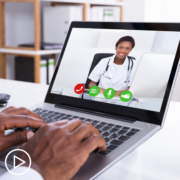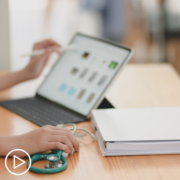Will Telemedicine Give More CLL Patients Access to Clinical Trials?
Will Telemedicine Give More CLL Patients Access to Clinical Trials? from Patient Empowerment Network on Vimeo.
Though some with chronic lymphocytic leukemia (CLL) may have limited access to clinical trials at expert centers, telemedicine may change access for some patients. Watch as Dr. John Pagel shares how telemedicine might improve CLL clinical trial options.
See More From the CLL TelemEDucation Empowerment Resource Center
Related Resources:
Will Telemedicine Activate More Remote Tools to Manage CLL?

|

|

|
Transcript:
Stephanie Chuang:
There is a lot of attention being paid to clinical trials and progress, and so how might telemedicine impact clinical trials when it comes to CLL therapy?
Dr. John Pagel:
Well, I want to first tell the audience that clinical trials are critically important for many patients who have CLL. Clinical trials are really an opportunity to get something that’s better than the standard of care most often, or at least just as good and has the promise again, to be better. We have advanced major new paradigm changing therapies over the last many years through clinical trials, and now we’re looking at really exciting things like bispecific antibodies, newer generations of these targeted therapies that are better tolerated and perhaps even more active in resistant patients. And even as we talked about CAR T-cell therapies, those are all only available through clinical trials, and then that’ll continue to evolve and go on as well.
I would encourage patients to think about clinical trials, and because of telemedicine, now we’re going to be able to reach to other patients who are further away from an expert, perhaps where clinical trials are only available, and they can be then involved in one of those opportunities. Telemedicine, I hope, and I believe, will be a major advance for getting the cutting-edge, best therapies for patients who might be very far away from a very important expert center.
Will Telemedicine Activate More Remote Tools to Manage CLL?
Will Telemedicine Activate More Remote Tools to Manage CLL? from Patient Empowerment Network on Vimeo.
As telemedicine has grown in the management of chronic lymphocytic leukemia (CLL) care, will its use bring other remote tools into patient care? Watch as CLL expert Dr. John Pagel explains.
See More From the CLL TelemEDucation Empowerment Resource Center
Related Resources:

|

|

|
Transcript:
Stephanie Chuang:
Dr. Pagel, there are tools out there like video otoscopes, electronic stethoscopes, thermoscopes, retinal imaging systems, will CLL patients be able to have access to those tools for themselves one day, and on that note, what are the tools you believe will impact the future of CLL care?
Dr. John Pagel:
Yeah, in fact, that’s really where we’re going. We do stuff like that already through the hospital. As you may know, as an example, if someone comes in with a cardiac condition, they need to be monitored remotely, they can’t stay in the hospital indefinitely we need to kind of know what’s happening, perhaps as an example with their heart rhythm. So they actually have tools where they can wear a little monitor even on their wrist that communicates with the doctor. So the doctor can see even in real time what’s happening with that individual patient.
These types of tools are the future, and we’re not going away from them, we’re embracing them. We’re not there yet for routine standard care, especially in CLL but they will be simple things like heart rate, blood pressure measurements that are very simple and easy to do that not only are able to be read by the patient, but actually again, from a remote standpoint, be electronically downloaded and delivered to the physician, real time. That’s going to be important. And actually, I believe that we’ll even add advances for that in the blood work or other approaches in the near future. So just stay tuned we’re just scratching the surface there.
Stephanie:
Okay, so you’ve heard it here first from Dr. Pagel, stay tuned on this.
Comprehensive Hematological Cancer Centers

Dr. Gerri Smoluk was a PEN Acute Myeloid Leukemia (AML) Network Manager. Gerri was a drug development scientist and patient advocate who was diagnosed with AML in 2016. She made it her mission to help patients ask the right questions of their care teams. She used her knowledge to help patients learn about medications for and the latest information about their disease. Using her science background, Gerri developed tangible resources to help other AML patients. She felt she had an advantage and made it her mission to use that advantage to help empower others to make better decisions. Gerri passed away July 27, 2020. Her legacy lives on inspiring other Network Managers to help more patients become empowered.
The Pro-Active CLL Patient Toolkit Resource Guide
Download this Guide Download this Guide
ePatient Virtual Courses
The ePatient virtual classrooms are designed to empower patients in all their healthcare matters.
ePatient 101
ePatient101: How to be an Empowered Patient, is an online course for anyone interested in becoming an empowered patient, empowered caregiver, or patient advocate. Through this online course taught by Alex Barfuss, you will learn:
- The meaning of the term “ePatient”
- Why being an ePatient is so important in today’s healthcare system
- How you can save time and money and get better overall value from your health care providers
- How to advocate for yourself
- Tools, tips and best practices to help manage your or your loved one’s chronic disease
Caregiver 101
Caregiver 101 is full of useful tools for caregivers and taught by Caregiving.com founder, Denise Brown. By taking this course, you will learn:
- How the carer/caree relationship can be a health relationship
- How to find balance
- How to find more time for your self
- How to ask for support
- Tips, tools, and tactics to be a better carer/caree
- Curated links and resources
- Videos
- Knowledge quizzes
- Support from a community of caregivers at cargiving.com
Chronic Lymphocytic Leukemia (CLL) 101
We are excited to be partnering up with Intake.me to bring you CLL 101. We wanted anyone struggling with a recent CLL diagnosis to become empowered through knowledge and support. By taking this course, you will receive:
- An overview of CLL
- Facts about CLL
- Curated links and resources
- Videos
- Knowledge quizzes
- Printable checklists with questions to ask your doctor
- Why you should immediately get a second, expert opinion
- Tips on building your healthcare team, and how your local doctor can work with a CLL expert to provide the best treatment
- Where to find the latest CLL research, clinical trials, and other treatment options
- Ability to ask questions from other CLL 101 students
These courses are part of the Intake.me experience and are free to everyone. You can sign up be clicking one of the buttons below. Enjoy!
|
|
|



